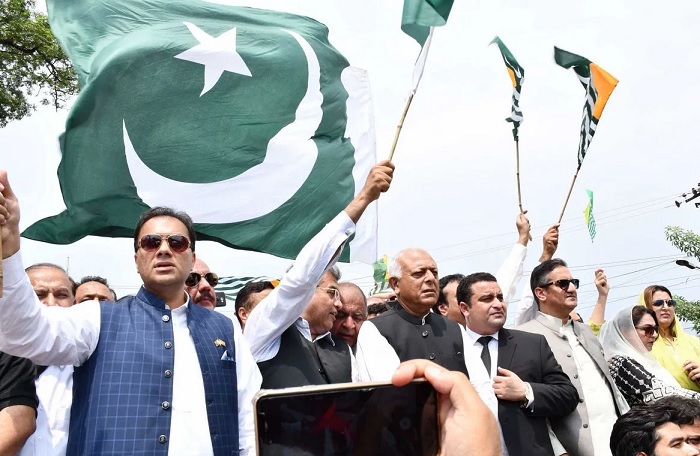
The rapidly shifting geopolitical realities, especially the current circumstances in South Asia, behove Pakistan to treat the Kashmir issue as its top priority; thankfully, Islamabad is doing that. The recent statement by Foreign Minister Shah Mahmood Qureshi concerning the establishment of an alternative Muslim bloc to deal with the Kashmir issue — in the face of Saudi opposition to raising it within the Organisation of Islamic Cooperation — is certainly historic.
Not for a half-century at least has Islamabad issued any statement even remotely close to being as “confrontational” as this one. There are, of course, a variety of factors at play which have led to the current Pakistani government to have the audacity to be publicly candid with the House of Saud.
Prime Minister Imran Khan’s incredibly vocal and relentless pursuit of justice for Kashmiris in the face of India’s annexation and ongoing settler-colonial brutality in the region (driven by India’s ruling BJP’s “Nazi” ideology) and the House of Saud’s immediate blessing of New Delhi’s inhumane action in occupied Kashmir is one such factor. The humiliation that Khan felt personally when Crown Prince Mohammad Bin Salman threatened him and Pakistan to prevent the prime minister from attending the Kuala Lumpur Summit last year proved to be a good lesson of the kind of “friend” that the de facto Saudi ruler really is.
Simultaneously, there are larger geopolitical shifts taking place, albeit gradually, that are increasingly enabling Islamabad to affirm its sovereignty and autonomy, and to a process of deepening decolonisation.
Certain changes in the global political economy have provided Pakistan with a position where the interests and future plans of the world’s two most formidable superpowers, the US and China, are dependent on Islamabad. The US, in its typical transactional and opportunistic way, is completely dependent on the Pakistani government to have some type of withdrawal from Afghanistan. America’s national security establishment is becoming very nervous about Pakistan’s indifference to Washington because of the former’s strengthening relationship with China. Meanwhile, China itself is effectively encircled by the US Navy and bases intent on some form of confrontation with Beijing, making Pakistan’s port at Gwadar literally a lifeline for China to fulfil its incredible need for energy as well as its preponderant role in global trade and supply lines.
In addition, it is becoming clear that there is something remarkably different about the current political dispensation in Pakistan itself. Both the civilian leadership of Imran Khan and the dominant sections of the military high command are in agreement about much of the foreign policy and national security objectives of the country at this critical juncture. This is something with which many “westoxicated” liberals in Pakistan are unhappy.
Islamabad no longer seems to be handicapped by either the old Cold War framework or the “War on Terror” era that kept Pakistan subordinate to and trapped by Washington’s needs.
Pakistani historian Ayesha Jalal has a predilection to highlight issues of self and sovereignty in post-colonial states such as Pakistan. Now is the right time to reimagine a pluralist and just Islamicate reconstruction embodied in the Pakistani polity.
Crucially, it is at this time when the weaknesses, not the strengths, of global and regional Zionism are on full display. Muslims throughout the world, as well as the millions upon millions of people in the Global South and Global North who stand in solidarity with the Palestinians, the Kashmiris and other oppressed peoples, see the blatant hypocrisy and cruelties of countries like Saudi Arabia, the UAE and Egypt. These nations not only refrain from calling out the crimes against humanity that Israel and India are perpetrating but, on the contrary, opt to bestow awards on them and/or legitimise the atrocities by recognising Israel in its post-1967 form.
These contradictions can no longer be concealed. Leaders like Imran Khan realise that this is the moment where meaningful Islamicate integration between Muslim nations and societies, seriously committed to social justice, could finally lead to the demise of what many analysts call the curse of Saudi Wahhabi hegemony.
As is well understood, this is no easy or small geopolitical manoeuvring that is taking place. It may very well take some time, but the signs are there. The effective enslavement of Islamabad to Riyadh for economic reasons may one day come to an end when Pakistan’s leadership starts taking more trips to Doha rather than Riyadh.
It’s a choice that Islamabad needs to make. Having disentangled itself from various humiliating forms of subordination to outside powers, it seems pretty clear that this dynamic of subordination has one remaining irritant left for Pakistanis: the House of Saud.
Fortunately, the Pakistani leadership has the option to be more independent and affirm its own dignity in deepening its integration and cooperation with other Islamicate countries such as Turkey, Iran, Qatar and Malaysia, as well as with other nations from the Global South. That seems to be the only way forward to deepening decolonisation for real, meaningful independence.
Looking further afield, we can see a trend of shifting alliances in the world, especially in the Eastern hemisphere. China is leading a bloc joined by Russia and Iran. Turkey and Malaysia are mobilising too, and it will not be a surprise if they try to jump in as well. In such a situation Pakistan finds itself in a very favourable position both geopolitically and economically. If addressed well, this is arguably the most critical juncture in the country’s history for Islamabad to take advantage of.
 Eurasia Press & News
Eurasia Press & News


